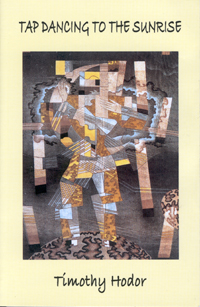Tap Dancing to the Sunrise
Timothy Hodor
By Alyce Wilson
Seldom do you see such a tightly thematic collection as Timothy Hodor's
Tap Dancing to the Sunrise, comprised entirely of poems about his
mother, impressions, he says, that "unfolded after her death and
a few subjects and sights that captured her interest throughout her
life."
Many of the poems deal with Hodor's grief, but these poems are so similar
in tone and substance that it's easy to skip over a gem like "The
Offspring", which recalls impressions from a first Christmas at
his parents' home in Arizona, where the family heard "intricacies
of animals."
Coyote voices stretched a cat's cradle
Across the desert. Strings of howls
Vibrated between saguaro fingers.
But now those days are gone: "Land developers zoned in the playground,
/ Chased out the children of the cacti". Ironically, this poem
about his lost childhood home resonates much more strongly than many
of his poems about his mother.
This collection lacks exactly what Hodor promised: impressions of his
mother. Sadly, he offers few concrete images but opts instead for a
multitude of metaphors. When writing personal poems involving raw emotion,
the poet must remember to open that personal feeling up to the reader.
Apparently, his mother was a world traveler, as he reveals in "On
the Cover", where he writes about the last card his mother sent,
where she wrote the words Italy, Austria and Arizona. The poem ends,
"places / We'd been — / Except the future." Instead of
ending with such a dire statement, he could have built on the poem,
sharing more memories of his mother in these places they'd traveled
together.
A poetry instructor once told me you do your best writing about a place
after you've left it, when you've had some time to reflect. I suspect
when Hodor wrote these poems, shortly after his mother's death, he was
still too close to the situation.
But these poems did serve a purpose: as therapeutic poems, helping
Hodor cope with his feelings. For that reason, they're simply too generalized,
too abstract. Perhaps, as time passes, Hodor will write new poems that
allow the reader to view the woman mourned, to participate in his grief.
Rating: *** (Good)
PS Avalon, 2006: ISBN 0-9544764-8-4
|

